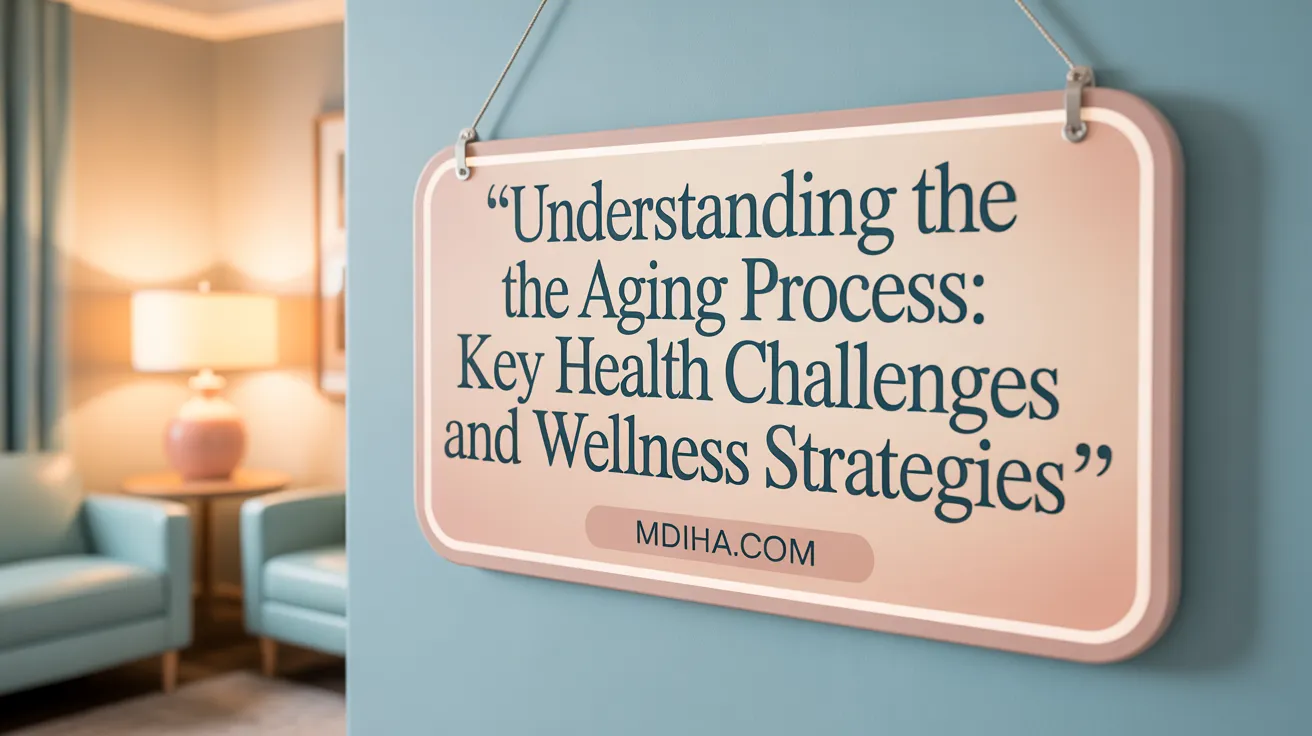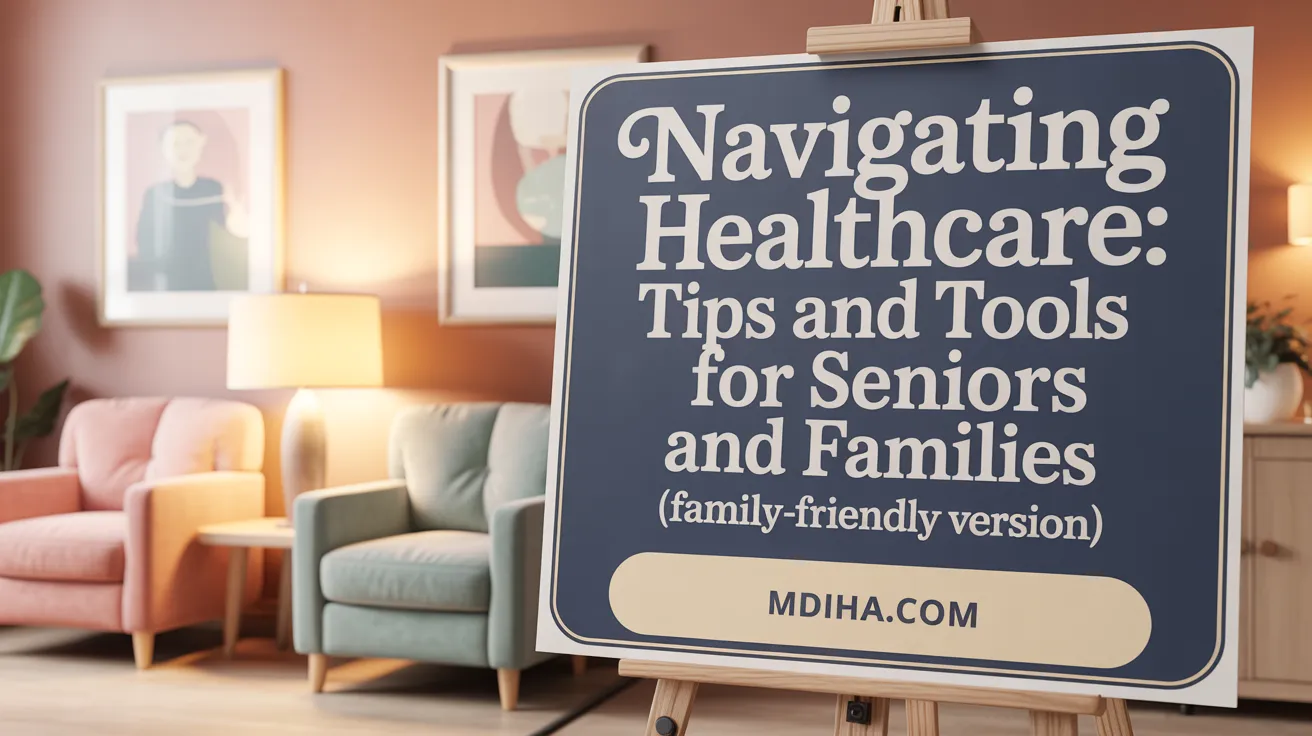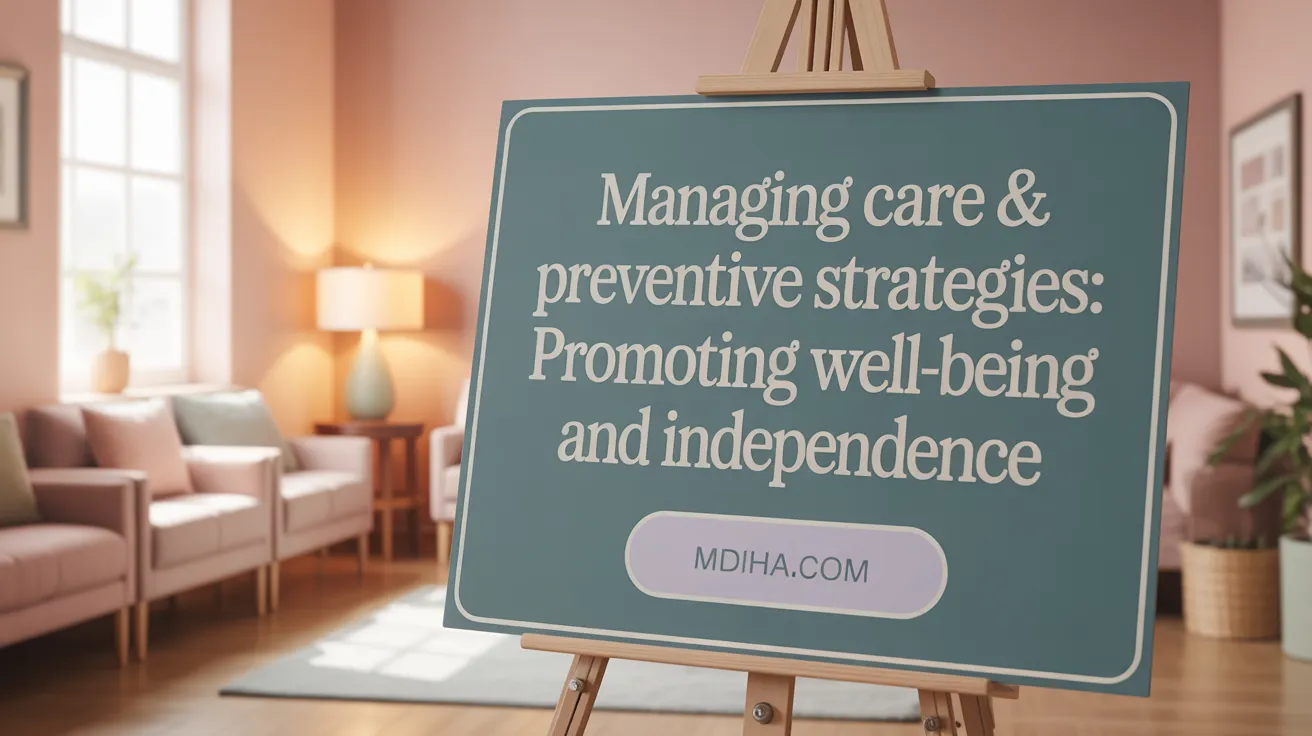Understanding the Aging Journey
Aging brings a complex interplay of biological, social, and emotional changes that affect health and well-being. Navigating this journey effectively requires comprehensive insight into the aging process itself, the healthcare systems in place, and the available resources that promote independence and dignity. This article provides directed medical insights to empower seniors and their caregivers with strategies to manage health challenges, access care, and embrace supportive environments for a fulfilling later life.
Demystifying the Aging Process and Common Health Challenges

What is the aging process and what health challenges are commonly associated with it?
Aging is a natural biological process characterized by gradual changes in the body's cells, tissues, and organs. These changes are driven by cellular transformations such as telomere shortening, accumulation of cellular damage, and decreased regenerative capacity. As a result, physical and mental functions tend to decline, leading to increased vulnerability to diseases and conditions common among seniors.
Older adults often face a range of health challenges that can significantly impact their quality of life. Cardiovascular issues like high blood pressure and heart disease are prevalent. Musculoskeletal conditions such as arthritis and osteoporosis can limit mobility and cause pain. Sensory impairments, including hearing and vision loss, may affect daily activities.
Cognitive decline, including conditions like dementia and Alzheimer’s disease, is a major concern. Mental health problems such as depression and anxiety also frequently affect seniors, sometimes exacerbated by social isolation.
Many older adults live with multiple chronic conditions simultaneously, a situation known as multimorbidity. Managing these conditions often involves complex medication routines, which can increase the risk of adverse effects—a situation called polypharmacy. Furthermore, aging increases the risk of hospitalizations due to falls, infections like COVID-19, and other acute issues.
Environmental factors, lifestyle choices such as diet, exercise, sleep, and social support significantly influence the aging process. Maintaining healthy habits and creating age-friendly environments can promote longevity and overall well-being.
This demographic shift results in heightened healthcare needs and challenges, demanding effective resource allocation, tailored care strategies, and efforts to address disparities in healthcare access and quality among older populations.
| Aspect | Description | Impact on Health |
|---|---|---|
| Biological Changes | Cellular damage, telomere shortening | Decreased organ function, increased disease susceptibility |
| Common Conditions | Hypertension, arthritis, sensory loss, cognitive decline | Reduced mobility, quality of life |
| Environmental & Lifestyle | Pollutants, diet, exercise, sleep | Accelerates aging, influences health outcomes |
| Social Factors | Isolation, support systems | Affects mental health and longevity |
| Healthcare Challenges | Multimorbidity, polypharmacy | Complex management and risk of adverse events |
Understanding the complex nature of aging helps shape effective health strategies, emphasizing prevention, early detection, and holistic care tailored to individual needs.
Navigating Healthcare Systems: Strategies for Seniors and Families

How can older adults effectively navigate healthcare systems and access necessary resources?
Navigating healthcare can be challenging for seniors, especially with complex needs and multiple providers involved. To ensure effective care, older adults should actively participate in their health management.
One of the first steps involves understanding the healthcare and insurance systems. Familiarity with Medicare coverage, available senior health services, and community resources is crucial. Seniors are encouraged to maintain a comprehensive and up-to-date health information portfolio, including lists of medications, medical histories, and emergency contacts.
Building a reliable healthcare team helps coordinate care efficiently. This team may include primary care physicians, specialists, caregivers, and family members. Regular communication among these parties fosters a more integrated approach to health management.
Using technology and digital resources can significantly aid in navigation. Digital health portals, educational websites, and health apps provide easy access to medical records, appointment scheduling, and medication reminders. These tools can simplify complex care routines and improve overall oversight.
Advocacy and assertive communication are essential. Seniors should feel empowered to ask questions, clarify treatment options, and express their preferences confidently during appointments. Preparing questions beforehand and bringing trusted loved ones can improve understanding and decision-making.
Community programs and care coordinators serve as additional support. Care coordinators or senior living advisors guide families through care options, insurance plans, and logistical arrangements. They often provide ongoing support, helping to address emerging needs and ensuring continuity of care.
In conclusion, successful navigation involves proactive engagement, leveraging available resources, and fostering strong communication within care networks. Embracing technology and community support systems further enhances seniors’ ability to access necessary healthcare services effectively.
Effectively Managing Medical Care, Medications, and Preventive Health

What are effective strategies for managing medical care, medications, and preventive health for older adults?
Proper management of health is vital to ensure a good quality of life for seniors. One of the most important steps is maintaining an accurate and current list of all medications, including prescriptions, over-the-counter drugs, supplements, and herbal remedies. This comprehensive medication record helps both seniors and healthcare providers stay informed and make safe treatment decisions.
Regular check-ups with healthcare professionals, such as primary care physicians and pharmacists, are crucial. These reviews help identify and eliminate unnecessary or potentially harmful medications, reducing risks like adverse reactions, falls, and hospitalizations. Managing medications effectively becomes especially critical when multiple health conditions require complex treatment plans.
Tools like pill organizers, medication charts, and reminder devices can significantly improve medication adherence. These tools help seniors take medications at the right time and in the correct dosage, preventing missed doses or accidental overdoses.
Communication plays a key role. Seniors should feel empowered to discuss side effects, medication instructions, and lifestyle considerations with their healthcare providers. Clear dialogue helps tailor treatments to individual needs and monitor for possible drug interactions.
Care coordination among multiple providers is essential for safe medication management, especially when dealing with polypharmacy. Regular medication reviews ensure safety and help avoid potentially inappropriate drugs.
Preventive measures, such as routine screenings and vaccinations, also contribute to health maintenance. Immunizations like influenza and pneumonia vaccines decrease hospitalizations and mortality risks. Adopting healthy lifestyle habits—balanced nutrition, regular exercise, sufficient sleep, and stress reduction—support chronic disease management and overall vitality.
Planning for medication management during travel, hospital stays, or emergencies ensures continuity of care and minimizes health risks. Leveraging technology, such as reminder apps and automated alerts, can further support adherence.
In summary, a combination of thorough medication management, proactive health screenings, healthy lifestyle choices, and clear provider communication forms the foundation of effective healthcare for older adults, helping them maintain independence and well-being.
Senior Living and Supportive Care Options to Match Individual Needs
What options are available for senior living and supportive care environments?
As people age, their healthcare and support needs can vary greatly. Recognizing this, there are different types of senior living environments designed to cater to these diverse needs.
Independent living communities are perfect for seniors who are active, healthy, and wish to enjoy a social lifestyle with amenities like clubhouses, outdoor spaces, and transportation services. These communities emphasize independence while offering optional support services.
Assisted living facilities provide assistance with daily activities such as bathing, dressing, medication management, and mobility. They help seniors maintain their independence in a supportive environment that ensures safety and health monitoring.
For seniors with more complex health needs, skilled nursing facilities deliver 24-hour medical care, rehabilitation services, and ongoing health supervision. These are suitable for those recovering from acute medical events or managing chronic conditions requiring intensive treatment.
Specialized memory care units focus on individuals with Alzheimer’s disease or other types of dementia. These environments are designed with safety features and therapeutic activities that promote cognitive function and emotional well-being.
Supportive Living and Respite Care options are also available. These provide temporary or part-time support, offering relief for caregivers and personalized care for seniors who need a little help but do not require full-time supervision.
Choosing the right setting depends on the senior's health status, personal preferences, and long-term goals. Consulting experts like senior living advisors can help families navigate these options effectively.
| Living Environment | Level of Care | Suitable For | Special Features |
|---|---|---|---|
| Independent Living | Minimal assistance | Active seniors | Social amenities, recreational activities |
| Assisted Living | Daily support | Seniors needing help with daily tasks | Safety features, health monitoring |
| Skilled Nursing | Full medical care | Complex health conditions | 24/7 medical attention, rehab services |
| Memory Care | Cognitive support | Dementia or Alzheimer's patients | Safety measures, therapeutic programs |
| Supportive & Respite | Short-term or part-time support | Caregiver relief, transitional care | Personalized planning, flexible support |
Understandably, selecting a care environment should align with individual health needs and personal preferences to ensure a comfortable, safe, and fulfilling aging experience.
Supporting Aging Loved Ones Through Healthcare, Legal, and Social Challenges

How can family and friends support aging loved ones through healthcare, legal, and social challenges?
Supporting aging loved ones effectively involves a combination of active participation, organization, and emotional support. One of the most critical ways family members can help is by engaging in healthcare decision-making. This includes having open discussions about the aging person's wishes, preferences, and treatment options. Establishing advance care planning tools like living wills and healthcare proxies ensures their medical choices are respected.
Coordinating medical care is another essential responsibility. Family members can assist in scheduling appointments, managing medications, and communicating with healthcare providers. This helps prevent medication errors and ensures consistent care, especially for those with chronic health conditions.
Legal support forms the backbone of safeguarding a loved one’s interests. Setting up power of attorney allows trusted individuals to make financial or health-related decisions if the elder becomes unable to do so. Understanding and applying for benefits such as Medicaid and Medicare can help cover healthcare costs, while legal documents like living wills specify end-of-life preferences.
Providing social and emotional support is equally vital. Regular visits, companionship, and encouraging participation in community activities combat loneliness, which is linked to better mental and physical health outcomes. Creating opportunities for social interaction can preserve cognitive function and promote emotional well-being.
Families can also utilize community resources to ease caregiving burdens. Respite services, transportation options, and home-delivered meals support daily needs. Support groups for caregivers offer a platform to share experiences, gain advice, and find emotional relief.
By actively engaging in these areas, families and friends can significantly enhance the quality of life and health outcomes for their aging loved ones, ensuring they feel supported, respected, and connected.
| Support Area | Actions | Helpful Resources |
|---|---|---|
| Healthcare decision-making | Discuss wishes, establish advance directives | Aging and Disability Resource Centers |
| Medical coordination | Schedule appointments, manage medications | Medical management apps, healthcare providers |
| Legal safeguards | Power of attorney, living wills, proxies | Legal professionals, elder law services |
| Emotional support | Regular visits, social activities | Community centers, support groups |
| Community resources | Respite care, transportation, meals | Local senior centers, home care agencies |
Policy, Resources, and Tools to Enhance Senior Healthcare and Independence

What policy reforms and systemic approaches can improve healthcare for seniors?
To better support aging populations, comprehensive policy reforms are essential. One significant initiative is Medicare 2.0, which aims to modernize the existing system by expanding coverage options, reducing out-of-pocket costs, and enhancing prescription drug policies. These reforms seek to create a more affordable, equitable, and user-friendly healthcare experience for seniors.
Alongside these updates, integrating care models that emphasize coordination among providers can lead to more personalized and effective services. Value-based payment systems incentivize quality over volume, encouraging healthcare providers to focus on outcomes rather than service quantity.
Expanding telehealth services is another vital component. Making telehealth flexibilities permanent and simplifying prior authorization processes remove barriers to accessing care at home, especially for those with mobility issues or in rural areas.
Finally, involving older adults in policy development through 'What Matters' conversations and public engagement initiatives ensures that reforms reflect their real needs and priorities. These systemic approaches, combining legislative action, innovative care delivery, and stakeholder participation, are critical to advancing senior healthcare.
What resources, education, and support networks are available for elder care and transitions?
Numerous resources support seniors and their caregivers during healthcare transitions and ongoing care. Community-based services and evidence-based programs like the Care Transitions Intervention® and TCARE® help coordinate safe transfers between care settings, reducing hospital readmissions and caregiver stress.
Support organizations such as Area Agencies on Aging, SHARE, and Respecting Choices offer training, advance care planning tools, and language support to empower seniors and families. These programs emphasize dignity and respect while promoting informed decision-making.
Medicaid's Home and Community-Based Services (HCBS) and Transition Services assist older adults in transitioning from nursing homes to community living, providing essential support with housing, daily activities, and health management.
Online resources like PREPARE facilitate advance decision-making, ensuring individuals' care preferences are known and respected during periods of health crises.
Additional Information
| Resource Type | Description | Example Initiatives |
|---|---|---|
| Policy Reforms | Legislative actions aimed at improving system efficiency | Medicare 2.0 |
| Care Models | Integrated, value-based, and patient-centered care approaches | Accountable Care Organizations (ACOs) |
| Telehealth Expansion | Remote healthcare delivery enabled by policy changes | Permanent telehealth flexibilities |
| Support Programs | Community and caregiver supports, education, and planning tools | Respecting Choices, Power tools for Caregivers |
| Transition Services | Facilitates move from institutional to community-based living | Medicaid HCBS programs |
Supporting senior independence requires coordinated efforts across policy, community organizations, and technological innovations. By investing in these areas, society can ensure that older adults enjoy healthier, more autonomous, and dignified lives.
Embracing the Aging Journey with Confidence and Support
Navigating the aging process is a multifaceted challenge that encompasses health management, social connections, legal planning, and adapting to changing environments. With proactive engagement, access to informed resources, supportive care options, and evolving policy frameworks, seniors and their families can foster independence, dignity, and quality of life. Empowered by knowledge, technology, and community support, everyone can navigate the aging journey with confidence and resilience, ensuring that these later years are lived with respect, purpose, and well-being.
References
- A Helpful Guide to Navigating Healthcare as a Senior
- Navigating Healthcare in Senior Years: A Comprehensive ...
- HELPING FAMILIES NAVIGATE THE JOURNEY OF AGING
- Understanding Care Navigation by Older Adults With ...
- Unveiling the Secrets of Aging in Santa Rosa, CA
- Your Aging Coach
- Discussing Health and Wellness with Aging Parents
- Caring for Aging Parents
- Social Determinants of Health and Older Adults
- Healthcare Navigation for Seniors
